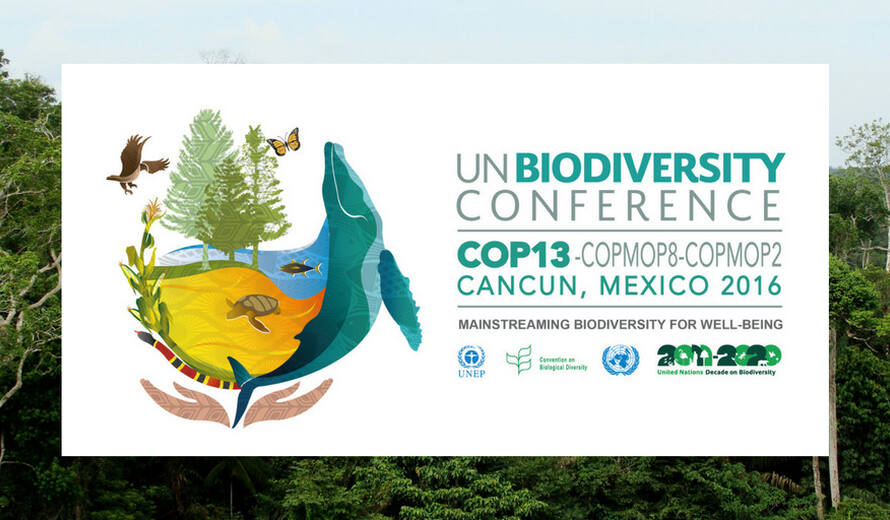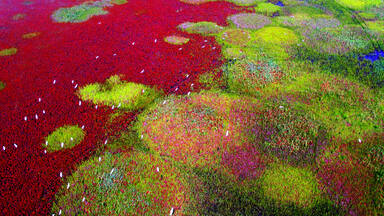UN Biodiversity Conference COP13 to be held in Cancun, Mexico
The UN Biodiversity Conference COP13 will be held during 4-17 December 2016 in Cancun, Mexico. It is the highest governing body of the Convention on Biological Diversity (CBD) which brings together representatives of the countries party managers and key players to promote the implementation of the Convention.
Since the CBD came into force in December 1993, the COP has held 12 regular meetings and adopted 367 decisions. Meanwhile, from their respective origins, each of its protocols has a previous meeting to the COP called meeting of the Parties (COP-MOP).
Mexico will host the 13th meeting of the Conference of the Parties (COP 13), the eighth COP-MOP of the Cartagena Protocol (COP-MOP 8) and the second COP-MOP Nagoya Protocol (COP-MOP 2) from 2 to 17 December 2016 in Cancun.
Under the Convention on Biological Diversity (CBD), the theme of Mainstreaming Biodiversity is supported by Article 6, subsection b, which states that each party “integrate, as far as possible and as appropriate, the conservation and sustainable use of biodiversity in plans, programs and sectoral and intersectoral policies “; as well as in Article 10, subsection a, it calls on the parties to “integrate, as far as possible and as appropriate the conservation and sustainable use of biological resources into national decision-making.”
During COP 13, about ten thousand participants, including representatives of the countries parties, observer countries, international organizations and others interested will meet in Cancun to negotiate agreements and commitments that give impulse to the conservation and sustainable use of biodiversity as well as the implementation of the Strategic Plan for Biodiversity 2011-2020 and the Aichi goals.
Biological Diversity that is valued, conserved, restored and used rationally contributes to human welfare and reduces poverty. Globally also adds to the overall objectives of sustainable development and Agenda 2030, as emphasized by the Secretariats of the seven biodiversity related conventions in their Joint Statement on the occasion of the United Nations Sustainable Development Summit, and message on UN Sustainable Development Goals and the Aichi Biodiversity Targets on the occasion of the September 2016 IUCN World Conservation Congress.
UNESCO is leading through the World Heritage Convention and the World Network of Biosphere Reserves, as well as the Global Geoparks programme, contributing to the conservation of sites with outstanding universal value, including their rich biodiversity. UNESCO’s 1052 World Heritage sites and 669 Biosphere Reserves are learning platforms for local sustainable development solutions, covering all major ecosystems. The 120 UNESCO Global Geoparks, in 33 countries, play a major role in geo-heritage protection and education, contributing to biodiversity conservation.
These sites show how ecosystem services are directly benefiting local communities, with nature preservation moving hand-in-hand with local development, providing meaningful examples of sustainable development where new economic, social and cultural values interact in harmony. These sites reflect the importance of partnership at every level, stimulating the emergence of green societies that are fairer in sharing benefits, wiser in using resources, and more sustainable in generating livelihoods.
Combining our work across the social and natural sciences, including local and indigenous knowledge, UNESCO is supporting local communities, promoting education for sustainable development, building capacity for sustainable management, sharing best practices and forging new networks to protect biodiversity.
In her message on the occasion of 2016 International Day of Biological Diversity, Director-General Irina Bokova highlighted that “It took billions of years to create the biosphere we now enjoy, with its incredibly rich diversity of plants and animals -- it is our duty and responsibility to act now to preserve it for future generations. “
For more information on COP13, please visit http://cop13.mx/en/

